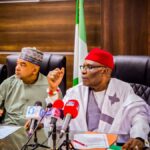72 hours no US Army in Nigeria — a boast by a serving soldier that has gone viral — has triggered fresh debate across social and traditional media about national pride, recruitment choices, and perceptions of foreign military presence.
The remark, attributed to a soldier identified only as a member of the Nigerian Armed Forces, read in part: “72 hours have passed, and we are yet to see the US Army in Nigeria. We Nigerian soldiers no small oo! That’s why some Nigerians are running to join the US Army, but you won’t see them coming to join the Nigerian Army, because we are too much.”
The clip, which surfaced on multiple social platforms on wednesday, has drawn both praise and criticism. Supporters hailed the soldier’s words as an expression of confidence in Nigeria’s security forces, while critics warned the message risked inflaming nationalist sentiment and oversimplifying complex issues about migration, employment and military professionalism.
Military analysts told LeadNaija News that remarks such as these tap into longstanding public conversations on why some Nigerians pursue enlistment with foreign armed services. “Economic opportunity, training, and relative stability are major drivers for anyone who chooses a foreign military career,” said one analyst who asked not to be named. “That does not diminish professional pride in Nigerian soldiers — it simply underscores the broader socio-economic context.”
The soldier’s claim — framed by the focus phrase 72 hours no US Army in Nigeria — also revived questions about the prospect and propriety of foreign military operations on Nigerian soil. Experts point out that any deployment of a foreign army inside Nigeria would require the explicit consent of the Federal Government and appropriate legal frameworks, a process involving diplomacy and parliamentary oversight.
Political reaction was swift. Opposition spokesmen accused the government of failing to create adequate opportunities for young Nigerians, saying the soldier’s comment indirectly highlighted gaps in recruitment, welfare and career progression within the national forces. Government supporters countered that the statement should instead be used to boost morale and show public confidence in the Nigerian military’s capability.
Civil society groups called for measured public discourse. “We should celebrate our security forces where merited, but also interrogate the structural incentives that lead talented Nigerians to seek careers abroad,” said a rights advocate. “The conversation must include pay, training, and access to social services.”
Veterans’ associations were largely circumspect. Some former service members welcomed the patriotic sentiment in the clip, saying it reflected esprit de corps that is vital for armed forces. Others, however, urged caution, warning that military personnel must refrain from statements that could be misconstrued as endorsing isolationist or jingoistic positions.
The viral clip has also prompted debate among youths on social media. Hashtags and threads alternated between humorous takes and serious threads dissecting the economics of foreign enlistment, the adequacy of domestic military benefits, and the broader security environment that prompts young Nigerians to make life-changing decisions.
Legal scholars reminded the public that the Nigerian Constitution vests security responsibilities in the Federal Government and that any foreign military footprint inside the country would be a matter of public record and subject to legal scrutiny.
As the conversation unfolds, stakeholders called for a balanced approach—one that recognizes and celebrates the bravery and professionalism of Nigerian soldiers while addressing the root causes that push citizens to seek opportunities abroad.
For now, the soldier’s line — 72 hours no US Army in Nigeria — remains the rallying phrase of the moment: a short, provocative statement that has opened a wide national conversation about pride, policy, and the future of Nigeria’s security sector.





